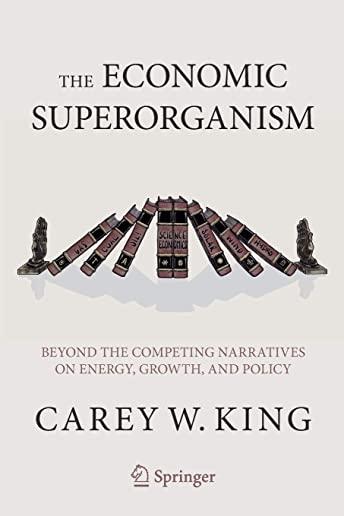
King, Carey W.
product information
description
1Preface: Why we need to understand the Truthiness of Energy Part I: BackgroundChapter 1: History of Energy, Background of ways of thinking about the future and various people making "truthy" statements.Chapter 2: Story 1: Fossil Fuels: why they are seen as good and badChapter 3: Story 2: Renewable Energy: why it is seen as good and badPart II: The broader perspective within which energy systems resideChapter 4: Other relevant trends of the world (population and demographics, water, land, debt and interest rates, climate - we really are in an unprecedented situation)Chapter 5: Systems thinking and understanding interdependence of world systemsChapter 6: How Macroeconomic modeling works now: World, we have a problem (ignores too many relevant trends, discuss implications of current macroeconomic modeling for low-carbon transition that say anything is possible).Chapter 7: Why the problem with Stories 1 & 2 is the same: Finite Earth, minimum in energy and food costs, overhead, debt, and other trends discussed in this Part 2.Chapter 8: The economists' delusions and distractions: confidence, political will, technological optimism, "better finance", etc. These are all part of Story 1 and/or Story 2 (with a little tweak we can just keep going)Part III: The Earth is finite and both Stories (1 = fossil, 2 = renewable) have constraints ignored by most economistsChapter 9: Paying attention to the obvious fact: the Earth is finite, it takes time to change, you need to recognize when this fact is becoming relevant. It is relevant now, independent of climate change. Here is where I discuss that the cost of energy and food'' (relative to GDP and incomes) as core resources for humans is behind the two major turning points in post-WW II society: (i) early 1970s, (ii) 2000s (leading to financial crisis)Chapter 10: Why we are shifting to renewables and low-variable cost society (low interest rates, depletion, net energy, size of energy and food sector); Comparing Renewables and Fossil (net energy, fixed vs. variable costs, other systems metrics). This is an expected trend of capitalism (per Karl Marx).Chapter 11: Likely upcoming decisions society will have to consider. Discuss the uncertainties and ideas to look out for. Consumers versus technology. Moving to less ownership and more services. How to think of political governance and accountability. Beware of truthiness.Chapter 12: Metrics, models, and ideas to watch. We need a new set of sound economic principles that are ready for a world of slower/declining growth and unpayable debt. We need to create better macroeconmic models and scenarios since the current macroeconomic approaches (for low-carbon transition) are not feasible.
member goods
No member items were found under this heading.
listens & views

EUGENE ONEGIN (IN ENGLISH)
by TCHAIKOVSKY / KANAWA / GEDDA / HAMPSON / MACKERRAS
COMPACT DISC$24.49
Return Policy
All sales are final
Shipping
No special shipping considerations available.
Shipping fees determined at checkout.






